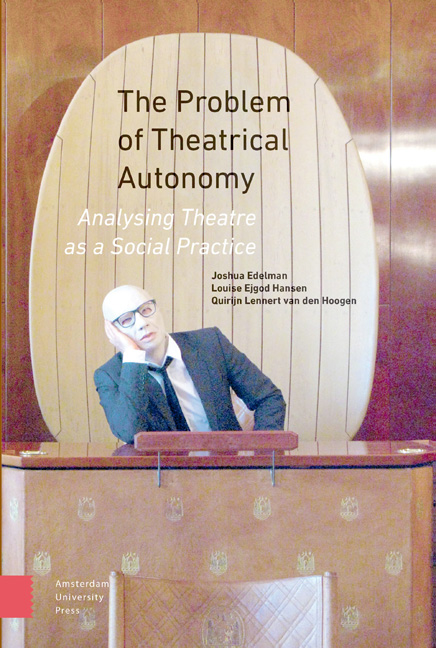Book contents
- Frontmatter
- Acknowledgements
- Contents
- List of Figures and Tables
- Introduction
- 1 How Can we Define Autonomy?
- 2 The Concept of Artistic Autonomy
- 3 Autonomy in the Contemporary Theatre
- 4 How Agents in Theatre Fields Make use of Claims to Autonomy
- 5 How Theatre Organization Shapes Claims to Autonomy
- 6 How Claims to Autonomy Serve those Outside Theatre Fields
- Conclusion
- References
- About the Authors
- Index
3 - Autonomy in the Contemporary Theatre
Published online by Cambridge University Press: 12 February 2021
- Frontmatter
- Acknowledgements
- Contents
- List of Figures and Tables
- Introduction
- 1 How Can we Define Autonomy?
- 2 The Concept of Artistic Autonomy
- 3 Autonomy in the Contemporary Theatre
- 4 How Agents in Theatre Fields Make use of Claims to Autonomy
- 5 How Theatre Organization Shapes Claims to Autonomy
- 6 How Claims to Autonomy Serve those Outside Theatre Fields
- Conclusion
- References
- About the Authors
- Index
Summary
Based on the idea that claims to autonomy can work in different ways, we move forward by introducing analytical examples at work. We start out by discussing an objection towards the argument that we advance in this book—that the problematics of autonomy provide a key tool for the development of a sociology of theatre. The objection is that, while the notion of autonomy may have been a useful tool in the past, it is simply not relevant to theatre in its contemporary form. Does contemporary theatre, with its keen awareness of itself as a social activity and its frequently critical stance towards that, still make a claim to autonomy? This chapter sets out our response to that argument. Through the analyses of different types of contemporary theatre forms, we will demonstrate that much contemporary theatre depends on a claim to autonomy, even if those claims are critical or implicit.
In this chapter, we will focus on the aesthetics of contemporary forms of theatre and investigate how these allow agents in and around performances to stake claims to autonomy. First, through a pair of examples, we will examine two forms of the argument against the importance of autonomy for contemporary theatre—the strong and the weak form. We will relate these objections back to our conception of the relationships within and around the theatrical field as presented in Figure 1 in the introduction. Then, we will discuss three different forms of contemporary theatre that seem to weaken or question the pursuit of specific value in theatre practices: post-dramatic and immersive theatre; verbatim and documentary theatre; and applied and community theatre. We will also take a closer look at the heteronomous part of theatre fields that, though not relying on a direct claim to autonomy, have developed specific forms that do still participate in the field's autonomy in meaningful ways. These forms include the commercial musical and stand-up comedy. They present their own compromises between value regimes that are sustained in an implicit (and sometimes more explicit) claim to theatrical autonomy. Through these examples and analysis, we will demonstrate that autonomy continues to be a necessary and useful intellectual tool for understanding the place that the theatre occupies in our contemporary society, even if claims to it are more opaque than they once were.
- Type
- Chapter
- Information
- The Problem of Theatrical AutonomyAnalysing Theatre as a Social Practice, pp. 75 - 96Publisher: Amsterdam University PressPrint publication year: 2016



